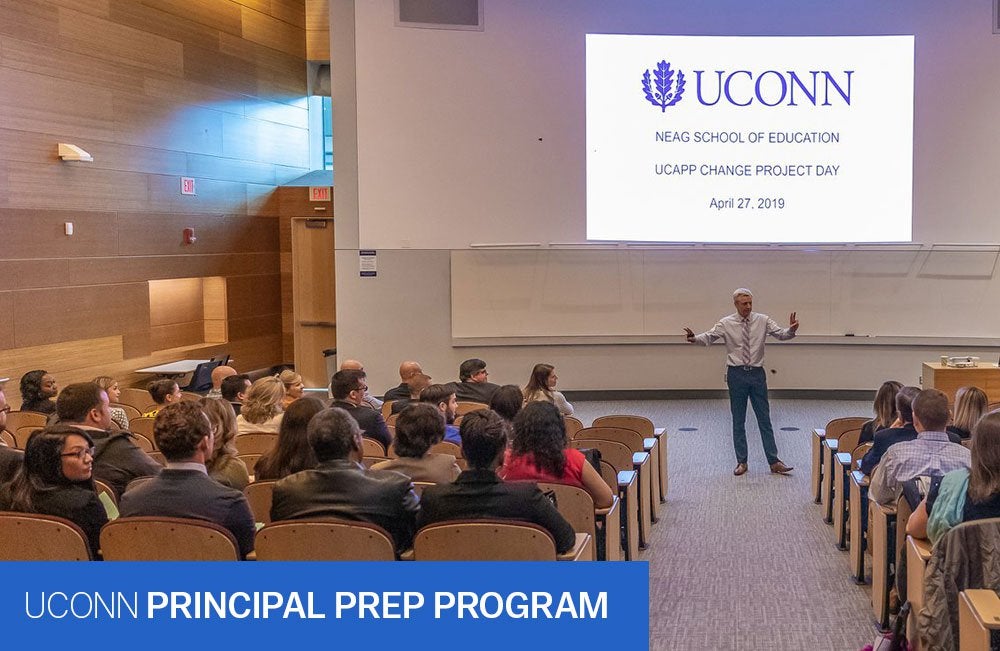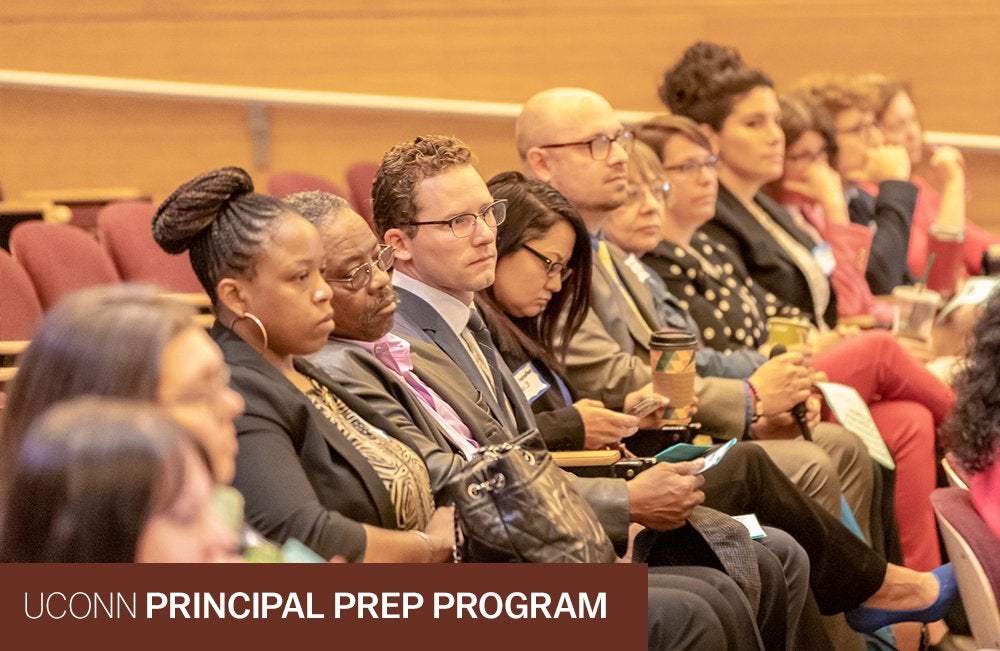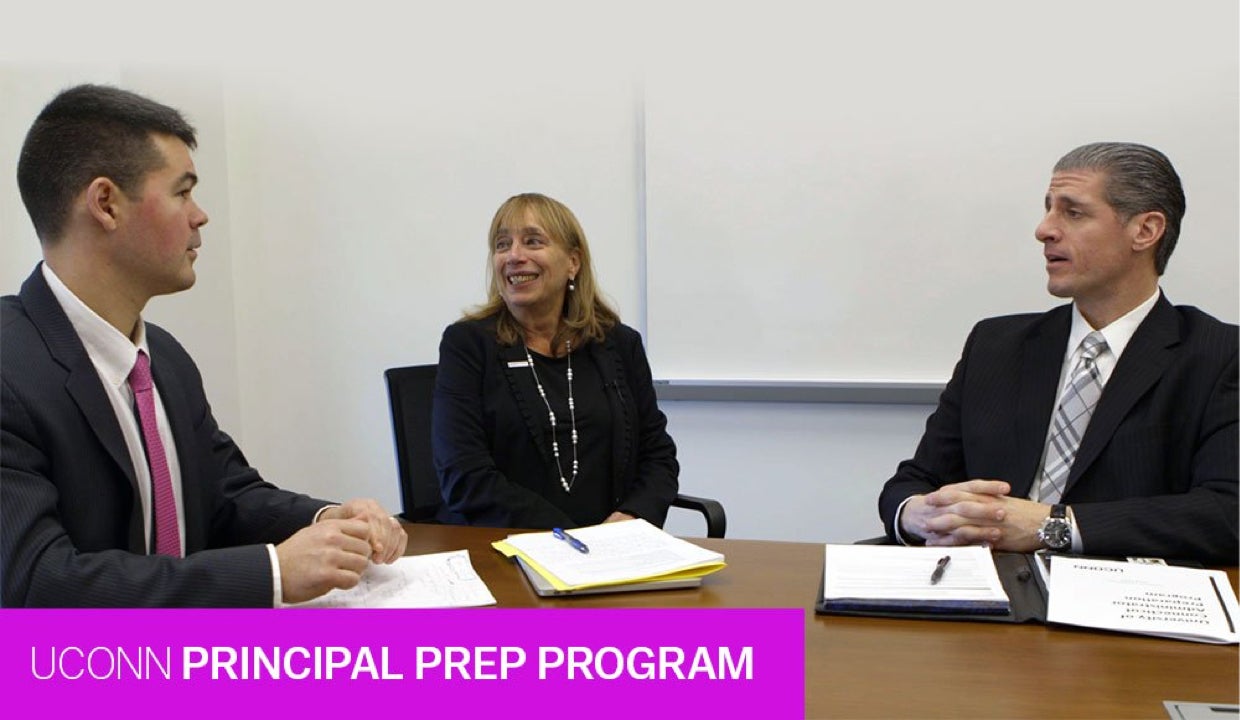This post is part of a series profiling the University of Connecticut’s efforts to strengthen its principal training program. The university is one of seven institutions participating in Wallace’s University Principal Preparation Initiative, which seeks to help improve training of future principals so they are better prepared to ensure quality instruction and schools. A research effort to determine the effects of the work is under way. While we await its results, this series describes one university’s work so far.
These posts were planned and researched before the novel coronavirus pandemic spread in the United States. The work they describe predates the pandemic and may change as a result of it. The University of Connecticut is working to determine the effects of the pandemic on its work and how it will respond to them.
It’s one thing to learn a skill in a class. It’s another to practice it in the real world, where conceptual lines are blurrier than they are in textbooks. It’s a distinction that leads many professional training programs to feature internships, which some may call clinical experiences of practicums, to complement the skills students learn in class. It is one that led the University of Connecticut’s Administrator Preparation Program (UCAPP) to reexamine internships when it began revamping its offerings to strengthen principal training.
UCAPP internships were once sets of largely isolated experiences, each designed to build a specific skill with little connection to the rest of a student’s training. Each student was matched to what UCAPP calls a “mentor principal,” an experienced school leader who guides the student through at list of activities, and a UCAPP supervisor, who ensured students met minimum graduation requirements. There were few structured opportunities to explore the interdependence of each of the required activities.
During a semester focused on clinical supervision, for example, a student would observe a teacher, provide feedback about the quality of instruction and check “performance evaluation” off the to-do list. There was no infrastructure in place to ensure that the student saw how that evaluation affects other areas of concern for principals, such as instructional leadership, school culture or the equity of educational opportunities.
UCAPP’s internships are now a lot more rigorous and, leaders hope, offer a more complete understanding of the principalship. The program still assigns each student to a host school for the two years of the program. Now, however, interns must visit the school regularly, get to know its staffers and help with several principalship responsibilities. UCAPP also assigns each student to what it calls a “coach,” a UCAPP staffer or a school-district leader who works closely with both student and mentor and helps draw connections to concepts covered in class. The goal, says TJ Salutari, principal of Daniel Hand High School in Madison, Conn., and a longtime mentor for UCAPP students, is to get students accustomed to the role of a school leader.
“One of the goals I have as a mentor principal is to help the teacher get beyond just thinking and responding as a teacher,” Salutari said. He wants students to think beyond individual classrooms and also consider the politics, administrative infrastructure, community relationships and legal systems that affect teaching and learning in schools. “When they get done with their internship, my goal is they don't sound like a teacher anymore,” he said.
Two major changes appear to be helping UCAPP students make the shift from their previous roles as teachers to future roles as leaders: the “core assessment,” a yardstick of students’ leadership skills, and the introduction of leadership coaches.
Not just an assessment
The core assessment, some UCAPP students say, is helping them understand how different concepts from the UCAPP curriculum come together in schools. It asks students to complete one project each term at their host schools and produce deliverables such as presentations to school staffers and memos to superintendents. Students then work with mentors and coaches to use these deliverables and assess whether they are on track to learn the skills they’ll need as principals. UCAPP designed the projects to touch on all four areas of leadership defined in the Connecticut Leader Evaluation and Support Rubric: instructional leadership, organizational systems, talent management and climate and culture.
Thomas Bushnell, a social studies teacher and first year UCAPP student interning at TJ Salutari’s school, said the assessment helped him see how different aspects of leadership must come together to improve student outcomes. He completed an “organizational diagnosis” at Salutari’s school, a requirement of the core assessment that asks interns to investigate reasons behind an achievement gap of their choice. He chose math scores among students with disabilities, an issue he assumed he would understand using teacher evaluation skills learned in instructional leadership courses.
But, Bushnell said, he quickly learned he had to dip into material from other courses as well. He had to survey parents to identify supports students most frequently receive at home, something he learned in an organizational leadership course. He had to ensure math teachers were working effectively with the special-education specialists, which required skills covered in talent management courses.
“We're noticing all of these connections between what we're learning in school and taking them to the internship experience,” Bushnell said. “The coursework matches up tremendously with what we're being asked to do as far as the internship is concerned. That's been my favorite experience.”
A little help from a friend
To help ensure students can make such connections, UCAPP introduced leadership coaches. Supervisors, who previously oversaw internships, focused largely on the bureaucratic details of the work. “They read student reflections [of internship experiences], made sure a total of 480 internship hours were completed over two years and helped resolve problems,” UCAPP director Richard Gonzales said. “It was a passive and compliance-oriented role.”
The program has now replaced supervisors with coaches, who work closely with interns and their mentors to ensure UCAPP students get a thorough introduction to the principal role. Coaches don’t just help resolve problems; they also help students set goals, devise plans to meet them and work with students and mentors to ensure adherence to and adaptation of these plans.
“Probably the biggest thing I do,” said Joanne Manginelli, a UCAPP coach who also serves as project coordinator for the program’s Wallace-funded efforts, “is help [students] make sense of what they're learning in the classroom and then bring it over into the internship and into real life.”
Manginelli coaches nine students in the 2019-2020 school year, including Thomas Bushnell. She maintains regular contact with each of them throughout the program, meeting with them and their mentors at least once a semester, and helps ensure they are on track to develop the leadership skills they will need. Bushnell says she has helped him think more clearly about his leadership experiences.
He pointed to a tense relationship between two staffers he had to help resolve. Bushnell approached the situation gingerly at first, without much luck. But conversations with Manginelli convinced him that he needed to be bolder and ask more of the staffer who appeared to bear greater responsibility for the conflict.
“She asked me to push a little bit more,” Bushnell said of Manginelli. “I did, and I was able to have a really great meaningful conversation. … It turns out that there were a couple of things that I was unaware of that had led to a rift between those two colleagues. And it ended up working itself out.”
“The role of the coach is to be there to ask the questions that help move [students] forward,” Manginelli said. “To know them well enough to know the skills and dispositions that they already have and where there are areas that you need to help them build.”
Bushnell says he appreciates the opportunity to have two sources of feedback from two different perspectives. “[Salutari and Manginelli] both asked me great questions that pushed me and challenged me, which I really appreciate,” he said. “That's been a great part of the whole coaching and internship experience so far.”
Such experiences require a fair amount of work, of course. Coaches need training and support. UCAPP administrators must maintain communications with coaches and mentors so classroom and internship experiences complement each other. Mentor principals must make time to ensure a valuable experience for their interns. And the schools where UCAPP students currently teach must hire substitutes while those students work in other schools learning to be principals.
It is too early to say whether these extra efforts will translate to improved performance among UCAPP graduates. The program’s careful reexamination of its internships, however, has drawn a significant source of support to continue its efforts. The Neag School of Education, of which UCAPP is a part, has earmarked $48,000 of annual funding from the school’s endowment to cover all costs of substitutes at UCAPP students’ home schools.
Such support could help train better principals. It could also help the schools in which they develop their leadership skills. Bushnell is thinking ahead to his “change project,” the capstone of the core assessment projects that he is to complete in his second year. The change project requires students to take elements of their work throughout the two years of UCAPP, learned both in class and in their internships, use them to help improve instruction at their host schools and work to ensure that the improvements continue beyond the internship.
“I’m hopeful,” Bushnell said, “that the work that I’ve done will last at the school, hopefully long after I’m gone.”
STORIES FROM UCONN PRINCIPAL PREP PROGRAM









